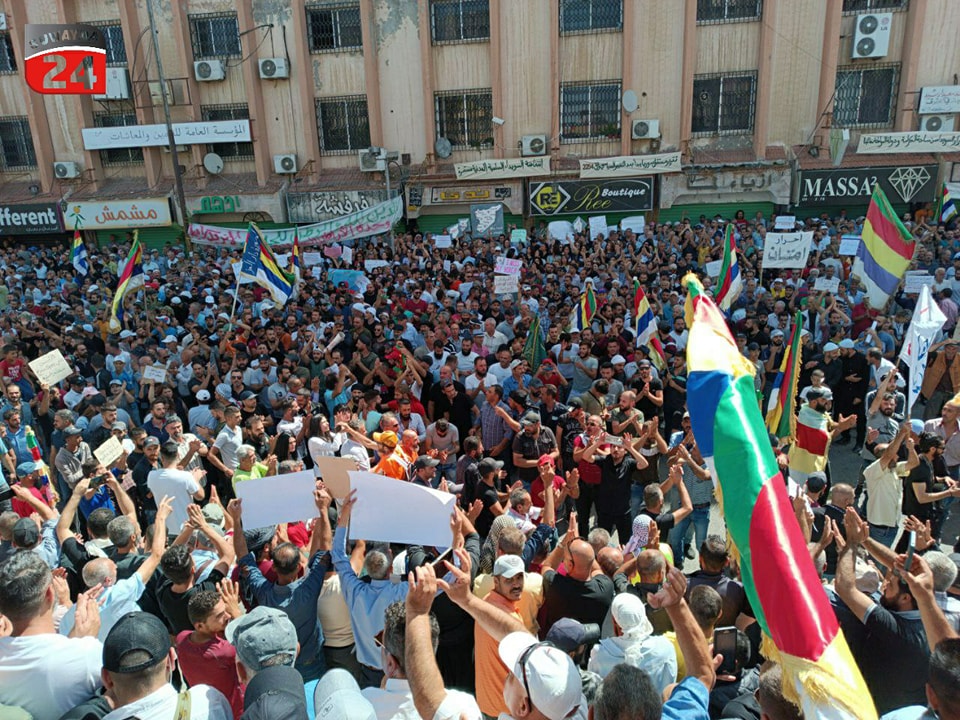Tensions in Suweida governorate have reached a boiling point following a disturbing incident in which demonstrators were fired upon by members of Assad’s forces in front of the Baath Party headquarters.
This incident has had a profound impact on the course of the movement, especially in light of international condemnation and criticism from prominent local figures, who strongly denounced the shooting of peaceful demonstrators. These figures have called for the movement to maintain its commitment to nonviolence.
Military Confrontation Looms in Eastern Aleppo as Factional Mobilizations Escalate
On Wednesday, individuals associated with the Baath Party opened fire on demonstrators who had attempted to close down the party’s headquarters, resulting in minor injuries to three individuals.
International concern and domestic boos
In response to the incident, Germany’s special envoy to Syria, Stefan Schneck, affirmed his country’s commitment to seeking accountability for those responsible for the repression of civilians in Suweida. He expressed his concern through his X account (formerly Twitter), stating, “We are deeply troubled by reports of the use of firearms against peaceful demonstrators in Suweida and the presence of injured civilians. The voices of these protesters deserve to be heard and should not be silenced by gunfire.”
The German envoy urged the Syrian regime to refrain from using violence and encouraged their participation in the UN-led dialogue as outlined in Resolution 2254. He concluded, “We will persist in our pursuit of accountability for those implicated in the suppression of civilians.”
Meanwhile, the US Embassy in Syria also conveyed its apprehension about the unfolding events in southern Syria through its social media channels. Their statement expressed Washington’s concern, stating, “We are deeply concerned about reports of the regime’s use of violence to quell protests in Suweida, Syria. We fully support the Syrian people’s right to engage in peaceful protests as they seek dignity, freedom, security, and justice. A political solution in accordance with UNSCR 2254 remains the sole viable path to resolving the conflict.”
Assad is in trouble
Ongoing protests demanding the ousting of the Assad regime persist in Suweida, marking the 27th consecutive day of demonstrations. Thousands of protesters congregated in Karama Square in the city center on Friday, fervently raising anti-regime slogans.
The rally is being described as the “largest” since the protests commenced, with participants hailing from various villages and towns within the governorate converging on the city center to join the movement.
According to a report by The National newspaper on Friday, the interconnected nature of the Druze minority in Suweida poses a political challenge for the regime, making it challenging to suppress the protests effectively.
The Suweida movement has attracted a diverse demographic, including a younger generation severely impacted by a decade-long economic collapse and an older generation of dissidents, as outlined in the report.
The report further notes that the secular character of the Suweida movement has made it difficult for authorities to label protesters as religious extremists. This surge in demonstrations has occurred at a time when Assad seemed to be gaining politically from Arab normalization efforts and the potential economic benefits tied to it. However, despite reports of substantial investments in Syria from various regional sources, tangible economic improvements have yet to materialize, leading to continued deterioration in the economy within regime-controlled areas.
The Syrian pound’s alarming depreciation to record lows, coupled with widespread inflation, has resulted in a significant erosion of wages for Syrians, sparking fears of worsening food insecurity.
This article was translated and edited by The Syrian Observer. The Syrian Observer has not verified the content of this story. Responsibility for the information and views set out in this article lies entirely with the author.


